

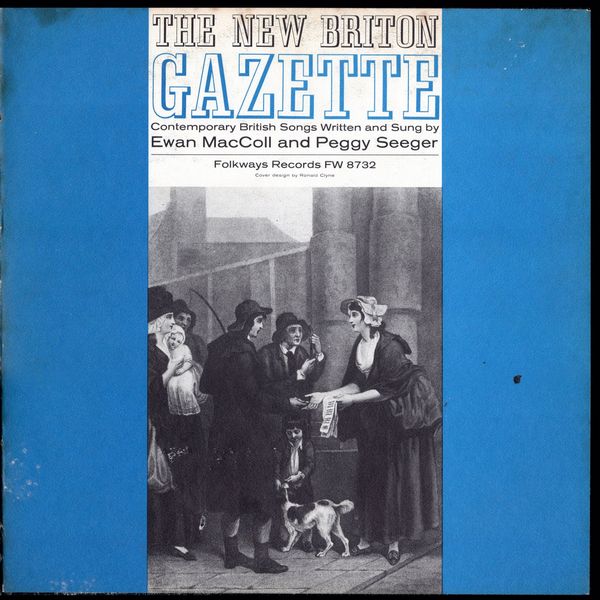 |
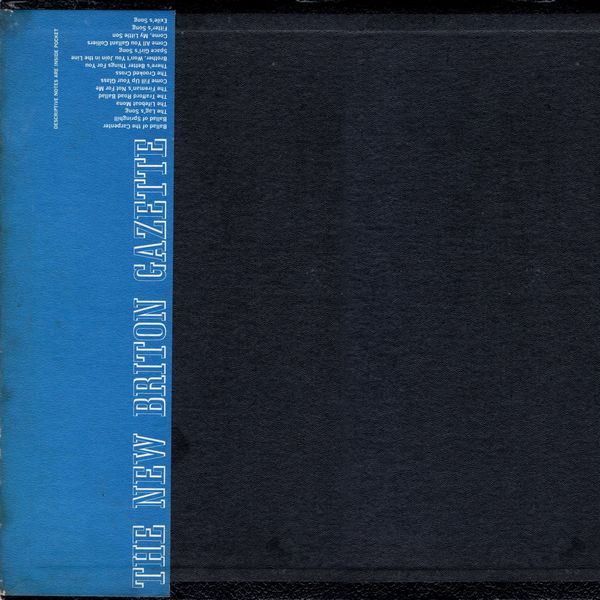
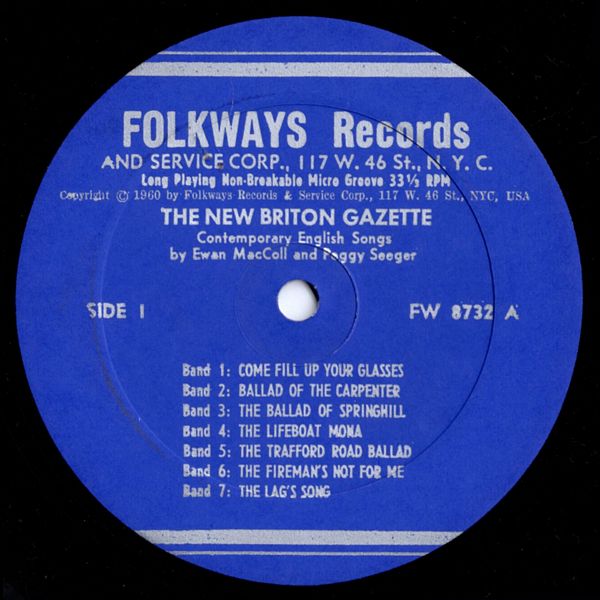
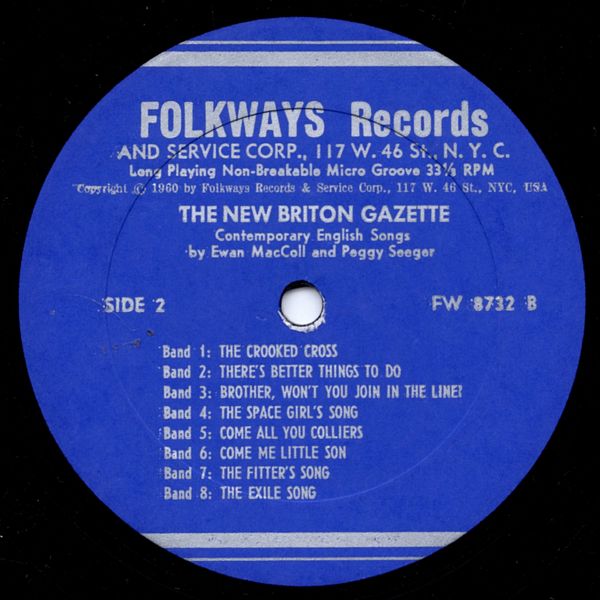
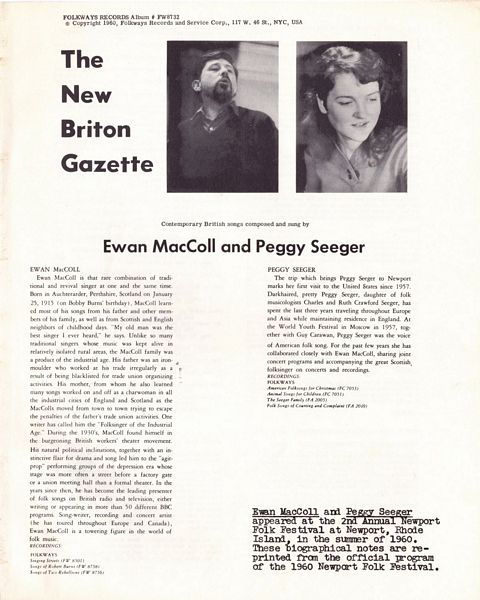 |
Sleeve Notes
EWAN MacCOLL — Ewan MacColl is that rare combination of traditional and revival singer at one and the same time. Born in Auchterarder, Perthshire, Scotland on January 25, 1915 (on Bobby Burns' birthday), MacColl learned most of his songs from his father and other members of his family, as well as from Scottish and English neighbors of childhood days. "My old man was the best singer I ever heard," he says. Unlike so many traditional singers whose music was kept alive in relatively isolated rural areas, the MacColl family was a product of the industrial age. His father was an iron-moulder who worked at his trade irregularly as a result of being blacklisted for trade union organizing activities. His mother, from whom he also learned many songs worked on and off as a charwoman in all the industrial cities of England and Scotland as the MacColls moved from town to town trying to escape the penalties of the father's trade union activities. One writer has called him the "Folksinger of the Industrial Age." During the 1930's, MacColl found himself in the burgeoning British workers' theater movement.
His natural political inclinations, together with an instinctive flair for drama and song led him to the "agitprop" performing groups of the depression era whose stage was more often a street before a factory gate or a union meeting hall than a formal theater. In the years since then, he has become the leading presenter of folk songs on British radio and television, either writing or appearing in more than 50 different BBC programs. Song-writer, recording and concert artist (he has toured throughout Europe and Canada), Ewan MacColl is a towering figure in the world of folk music.
PEGGY SEEGER — The trip which brings Peggy Seeger to Newport marks her first visit to the United States since 1957. Darkhaired, pretty Peggy Seeger, daughter of folk musicologists Charles and Ruth Crawford Seeger, has spent the last three years traveling throughout Europe and Asia while maintaining residence in England. At the World Youth Festival in Moscow in 1957, together with Guy Carawan, Peggy Seeger was the voice of American folk song. For the past few years she has collaborated closely with Ewan MacColl, sharing joint concert programs and accompanying the great Scottish, folksinger on concerts and recordings.
Ewan MacColl and Peggy Seeger appeared at the 2nd Annual Newport Folk Festival at Newport, Rhode Island, in the summer of 1960. These biographical notes are reprinted from the official program of the 1960 Newport Folk Festival.
Come Fill Up Your Glasses — tune: Traditional Text: Peggy Seeger
Ballad of The Carpenter — (Words and music by Ewan MacColl) Written in 1955, this ballad soon became popular in the London folk-song clubs and in 1957, was featured in the B.B.C. Christmas round-up of Great Britain. In Castleton, Derbyshire, where there is a long tradition of carol-singing among the sheep-farmers and limestone quarrymen, the song has already become part of local life.
The Ballad of Springhill — (Words by Peggy Seeger and Ewan MacColl, Music by Peggy Seeger) The pit disaster at Springhill, Nova Scotia, in 1958, made an enormous impression on people in Britain.
The dramatic newscasts made by CBC Halifax were carried regularly on British TV and, at the same time, ballads and come all ye's dealing with the disaster began to appear in the folk-song clubs. The ballad included in this album is now a firm favourite with British audiences and created a big impression in Canada when the authors introduced it there during a recent tour.
The Lifeboat Mona — (Words and music by Peggy Seeger) The month of December 1959 was marked by violent storms and continuous bad weather particularly in the North Sea areas. The lightship North Carr lying at the mouth of St. Andrews Bay lost her anchors and, at the mercy of a twelve-force gale, was in danger of foundering on the rocky coast.
At 2.0. a.m. on a wild December morning the Broughty Ferry lifeboat put out, the intention being to rescue the crew of the North Carr. For the next three hours the lifeboat fought the storm and during that time was in Radio-telephone communication with the land. At 5*0* a.m., however, communication ceased. The wreck of the Lifeboat, along with seven bodies of the crew of eight, was discovered on the following day grounded on the beach at Carnoustie .
Trafford Road Ballad — (Words and music by Ewan MacColl) Trafford Road runs through the heart of dockland in Salford, one of Britain's bleakest cities. The above song was written in 1948 for Landscape with Chimneys a play dealing with life in Salford.
The Fireman's Not for Me — Written for Isla Cameron in 1950 and featured in the BBC radio series of Ballads and Blues in that year.
When I Was A Young Lad —
The Crooked Cross — (Words and music by Peggy Seeger) The sudden crop of swastikas on synagogues and cemeteries in Germany aid. other parts of Europe, produced this song.
There's Better Things for You — (Words by Peggy Seeger. Melody, the gospel song There's better things) Written in 1958 as a marching song for the first Aldermaston march against the H bomb.
Brother, Won't You Join In The Line? — words: Ewan MacColl tune: American trad.
Space Girl's Song. — (Words by Peggy Seeger and Ewan MacColl. Melody, American Negro song, Ghost Soldier) Written in 1956 and now well known throughout the London folksong clubs.
Come All You Gallant Colliers — (Words by Ewan MacColl. Melody, Morissey and the Russian Sailor) Written in January i960 for Tyne-Tees Television Co., documentary film on coal, Burning Light.
Come, Me Little Son — (Words by Ewan MacColl. Melody, Come all ye tramps and hawkers) In 1959 Britain's first motor highway, the M 1, was completed. Some ten thousand workers, the majority of whom came from Ireland and North East Scotland, were employed on the job. Nearly all of them had been driven from their homes by unemployment. The project was the subject of a BBC radio-documentary, Song of a Road, of which this song is part.
The Fitter's Song — (Words by Ewan MacColl. Melody, The Ca3tlereigh River) Among the hundred or so workers who were recorded during the building of the M 1, was James Hunter a heavy tractor fitter from Newcastle on Tyne. Hunter, a quietly spoken giant, in his early forties had, prior to the war, worked in a garage. But … "it was a rusty old life", he said, and he had itchy feet. So, in his own words, he had "followed the big stuff-coal grabbing in the open-cast mines in India, tearing the guts out of hills in Rhodesia … then Australia, up in the Northern territory in the Uranium mines, then scooping out the dam on the Snowy River … " It was on the information supplied by him that the Fitter's Song was based. Written 1959 for SONG OF A ROAD.
Exile's Song — The genuine 'pincher kiddie' as the old style footloose navvy is called has almost disappeared. His place has been taken by the mechanical-shovel driver, the 'cat' and Euclid operator. However, like the early canal and railway builders, the modern 'muckshifers' are, for the most part, men forced to leave home as a result of economic pressure. In Hut 16 of the workers' hostel at Newton Pagnall on the motorway, 26 workers were recorded. Of this number, 19 were ex-fishermen from N.E. Scotland and from Kilkeen in Northern Ireland.
Their ages ranged from l6 years to 62 years. Almost all of them were hitter in their denunciation of a system which forces them to leave their families.
The above song was based on recordings made of James Graham of Kilkeel and Andrew and Duncan Jappie of Buckie, Aberdeenshire. Written in 1959 for Song of a Road.